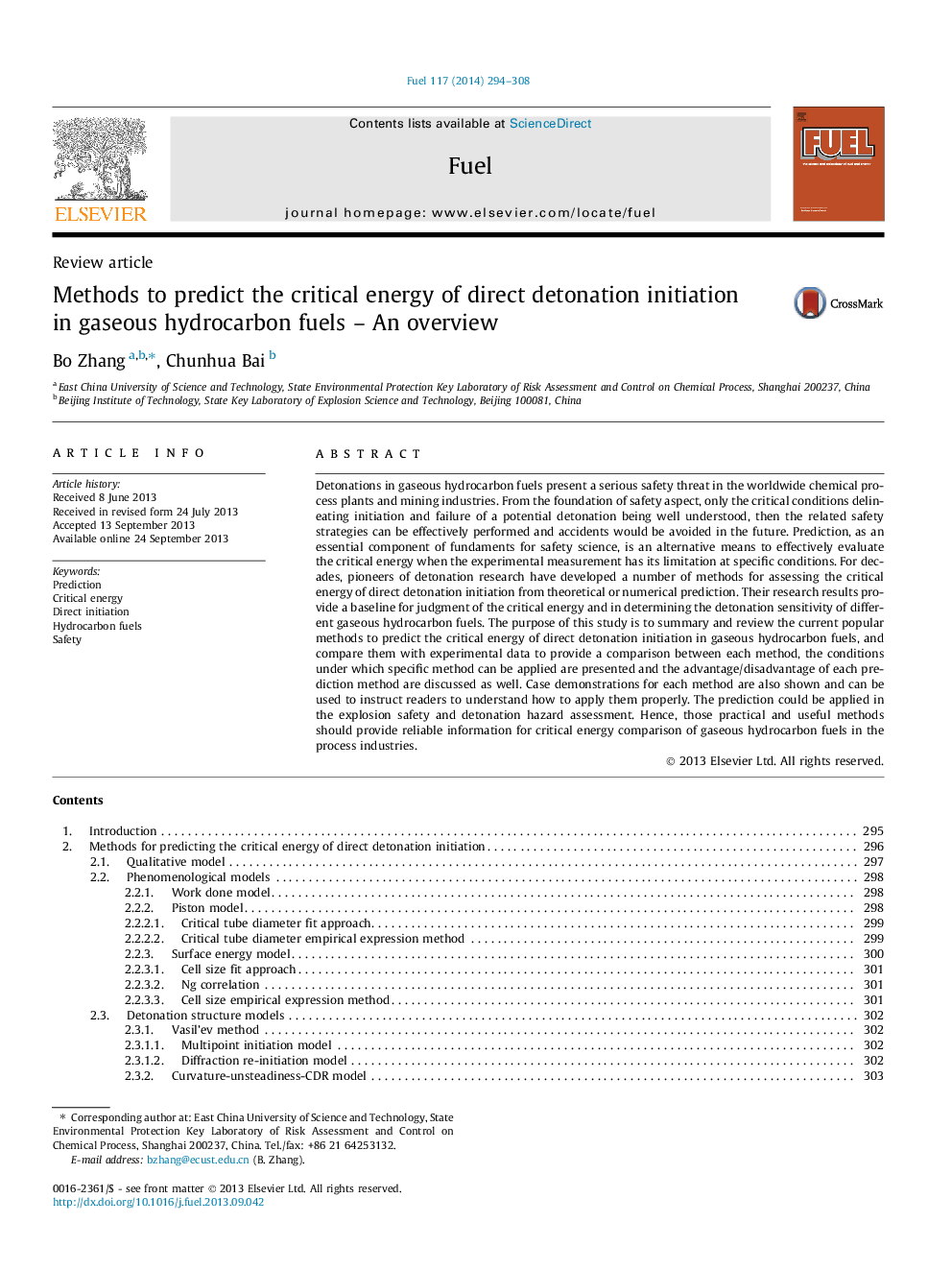| کد مقاله | کد نشریه | سال انتشار | مقاله انگلیسی | نسخه تمام متن |
|---|---|---|---|---|
| 10271874 | 461157 | 2014 | 15 صفحه PDF | دانلود رایگان |
عنوان انگلیسی مقاله ISI
Methods to predict the critical energy of direct detonation initiation in gaseous hydrocarbon fuels - An overview
ترجمه فارسی عنوان
روش های پیش بینی انرژی بحرانی آغاز انفجار مستقیم در سوخت های هیدروکربن گاز - یک مرور کلی
دانلود مقاله + سفارش ترجمه
دانلود مقاله ISI انگلیسی
رایگان برای ایرانیان
کلمات کلیدی
پیش بینی، انرژی انتقادی، شروع مستقیم، سوخت های هیدروکربن ایمنی،
ترجمه چکیده
انفجار در سوخت های هیدروکربن گاز یک تهدید جدی برای ایمنی در صنایع فرایند شیمیایی در سراسر جهان و صنایع معدنی است. از پایه و اساس یک جنبه ی ایمنی، تنها شرایط بحرانی مشخص کردن شروع و خرابی انفجار احتمالی را به خوبی درک می کنند، سپس می توان راهکارهای ایمنی مربوطه را به طور موثری اجرا کرد و در آینده از تصادف جلوگیری شود. پیش بینی، به عنوان یک جزء ضروری از پایه های علم ایمنی، یک روش جایگزین برای به طور موثر ارزیابی انرژی بحرانی است که اندازه گیری تجربی در شرایط خاص محدودیت خود را دارد. برای دهه ها پیشگامان تحقیقات انفجار، روش های متعددی برای ارزیابی انرژی بحرانی آغاز انفجار مستقیم از پیش بینی نظری یا عددی ایجاد کرده اند. نتایج تحقیقات آنها پایه ای برای قضاوت در مورد انرژی بحرانی و در تعیین حساسیت انفجاری مختلف سوخت های هیدروکربن گاز فراهم می کند. هدف از این مطالعه خلاصه کردن و بررسی روش های محبوب جاری برای پیش بینی انرژی بحرانی آغاز انفجار مستقیم در سوخت های هیدروکربن گاز است و مقایسه آنها با داده های تجربی برای مقایسه بین هر روش و شرایطی که در آن روش خاص می تواند باشد کاربردی ارائه شده است و مزیت / ضعف هر روش پیش بینی نیز مورد بحث قرار گرفته است. تظاهرات مورد برای هر روش نیز نشان داده شده است و می تواند مورد استفاده قرار گیرد تا خوانندگان را درک کند که چگونه به درستی آنها را اعمال می کند. پیش بینی می تواند در ارزیابی خطر انفجار ایمنی و انفجار مورد استفاده قرار گیرد. از این رو، این روش های عملی و مفید باید اطلاعات قابل اطمینان برای مقایسه انرژی بحرانی سوخت های هیدروکربن گاز در صنایع فرایند ارائه کنند.
موضوعات مرتبط
مهندسی و علوم پایه
مهندسی شیمی
مهندسی شیمی (عمومی)
چکیده انگلیسی
Detonations in gaseous hydrocarbon fuels present a serious safety threat in the worldwide chemical process plants and mining industries. From the foundation of safety aspect, only the critical conditions delineating initiation and failure of a potential detonation being well understood, then the related safety strategies can be effectively performed and accidents would be avoided in the future. Prediction, as an essential component of fundaments for safety science, is an alternative means to effectively evaluate the critical energy when the experimental measurement has its limitation at specific conditions. For decades, pioneers of detonation research have developed a number of methods for assessing the critical energy of direct detonation initiation from theoretical or numerical prediction. Their research results provide a baseline for judgment of the critical energy and in determining the detonation sensitivity of different gaseous hydrocarbon fuels. The purpose of this study is to summary and review the current popular methods to predict the critical energy of direct detonation initiation in gaseous hydrocarbon fuels, and compare them with experimental data to provide a comparison between each method, the conditions under which specific method can be applied are presented and the advantage/disadvantage of each prediction method are discussed as well. Case demonstrations for each method are also shown and can be used to instruct readers to understand how to apply them properly. The prediction could be applied in the explosion safety and detonation hazard assessment. Hence, those practical and useful methods should provide reliable information for critical energy comparison of gaseous hydrocarbon fuels in the process industries.
ناشر
Database: Elsevier - ScienceDirect (ساینس دایرکت)
Journal: Fuel - Volume 117, Part A, 30 January 2014, Pages 294-308
Journal: Fuel - Volume 117, Part A, 30 January 2014, Pages 294-308
نویسندگان
Bo Zhang, Chunhua Bai,
